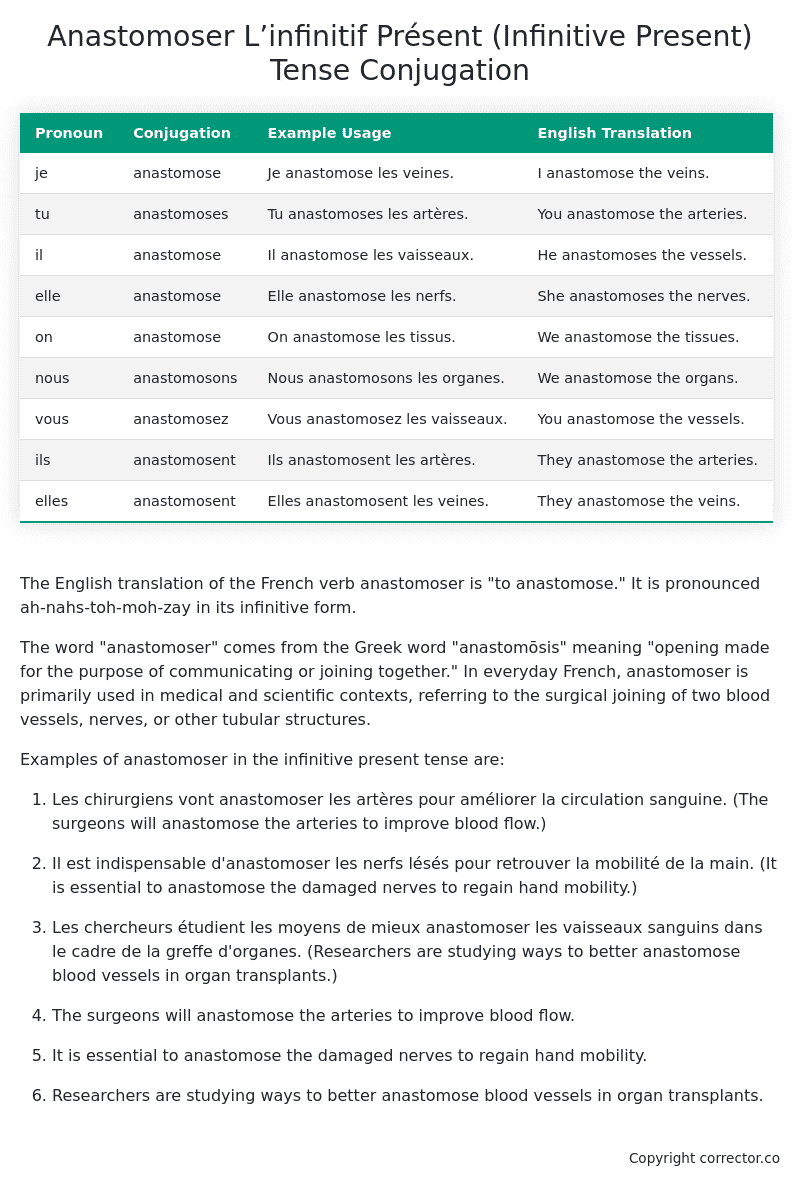L’infinitif Présent (Infinitive Present) Tense Conjugation of the French Verb anastomoser
Introduction to the verb anastomoser
The English translation of the French verb anastomoser is “to anastomose.” It is pronounced ah-nahs-toh-moh-zay in its infinitive form.
The word “anastomoser” comes from the Greek word “anastomōsis” meaning “opening made for the purpose of communicating or joining together.” In everyday French, anastomoser is primarily used in medical and scientific contexts, referring to the surgical joining of two blood vessels, nerves, or other tubular structures.
Examples of anastomoser in the infinitive present tense are:
-
Les chirurgiens vont anastomoser les artères pour améliorer la circulation sanguine. (The surgeons will anastomose the arteries to improve blood flow.)
-
Il est indispensable d’anastomoser les nerfs lésés pour retrouver la mobilité de la main. (It is essential to anastomose the damaged nerves to regain hand mobility.)
-
Les chercheurs étudient les moyens de mieux anastomoser les vaisseaux sanguins dans le cadre de la greffe d’organes. (Researchers are studying ways to better anastomose blood vessels in organ transplants.)
-
The surgeons will anastomose the arteries to improve blood flow.
-
It is essential to anastomose the damaged nerves to regain hand mobility.
-
Researchers are studying ways to better anastomose blood vessels in organ transplants.
Table of the L’infinitif Présent (Infinitive Present) Tense Conjugation of anastomoser
| Pronoun | Conjugation | Example Usage | English Translation |
|---|---|---|---|
| je | anastomose | Je anastomose les veines. | I anastomose the veins. |
| tu | anastomoses | Tu anastomoses les artères. | You anastomose the arteries. |
| il | anastomose | Il anastomose les vaisseaux. | He anastomoses the vessels. |
| elle | anastomose | Elle anastomose les nerfs. | She anastomoses the nerves. |
| on | anastomose | On anastomose les tissus. | We anastomose the tissues. |
| nous | anastomosons | Nous anastomosons les organes. | We anastomose the organs. |
| vous | anastomosez | Vous anastomosez les vaisseaux. | You anastomose the vessels. |
| ils | anastomosent | Ils anastomosent les artères. | They anastomose the arteries. |
| elles | anastomosent | Elles anastomosent les veines. | They anastomose the veins. |
Other Conjugations for Anastomoser.
Le Present (Present Tense) Conjugation of the French Verb anastomoser
Imparfait (Imperfect) Tense Conjugation of the French Verb anastomoser
Passé Simple (Simple Past) Tense Conjugation of the French Verb anastomoser
Passé Composé (Present Perfect) Tense Conjugation of the French Verb anastomoser
Futur Simple (Simple Future) Tense Conjugation of the French Verb anastomoser
Futur Proche (Near Future) Tense Conjugation of the French Verb anastomoser
Plus-que-parfait (Pluperfect) Tense Conjugation of the French Verb anastomoser
Passé Antérieur (Past Anterior) Tense Conjugation of the French Verb anastomoser
Futur Antérieur (Future Anterior) Tense Conjugation of the French Verb anastomoser
Subjonctif Présent (Subjunctive Present) Tense Conjugation of the French Verb anastomoser
Subjonctif Passé (Subjunctive Past) Tense Conjugation of the French Verb anastomoser
Subjonctif Imparfait (Subjunctive Imperfect) Tense Conjugation of the French Verb anastomoser
Conditionnel Présent (Conditional Present) Tense Conjugation of the French Verb anastomoser
Conditionnel Passé (Conditional Past) Tense Conjugation of the French Verb anastomoser
L’impératif Présent (Imperative Present) Tense Conjugation of the French Verb anastomoser
L’infinitif Présent (Infinitive Present) Tense Conjugation of the French Verb anastomoser (this article)
Struggling with French verbs or the language in general? Why not use our free French Grammar Checker – no registration required!
Get a FREE Download Study Sheet of this Conjugation 🔥
Simply right click the image below, click “save image” and get your free reference for the anastomoser L’infinitif Présent tense conjugation!

Anastomoser – About the French L’infinitif Présent (Infinitive Present) Tense
Forming the Infinitive Present
Common Everyday Usage Patterns
As a Verb’s Dictionary Form
After Modal Verbs
As an Imperative
In Infinitive Clauses
Interactions with Other Tenses
Present Tense
Future Tense
Conditional Tense
Passé Composé
Imperfect Tense
Subjunctive and Conditional Moods
Summary
Want More?
I hope you enjoyed this article on the verb anastomoser. Still in a learning mood? Check out another TOTALLY random French verb conjugation!


